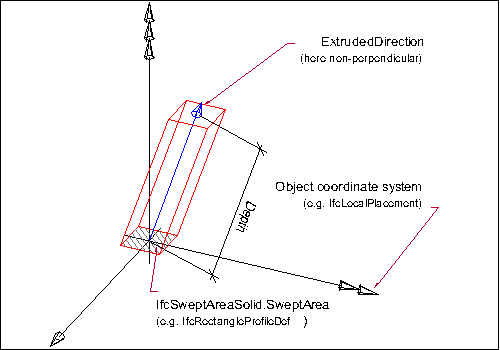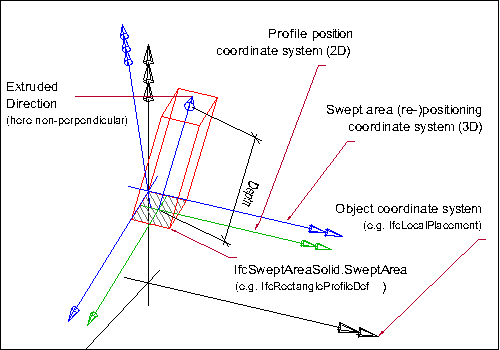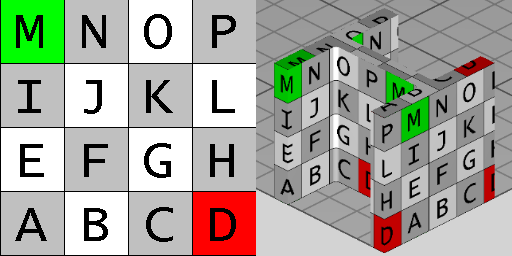Natural language names
 | Festkörper - aus extrudierter Fläche |
 | Extruded Area Solid |
Change log
| Item | SPF | XML | Change | Description | IFC2x3 to IFC4 4.0.0.0 |
|---|---|---|---|---|
| IfcExtrudedAreaSolid | ||||
| Position | MODIFIED | Instantiation changed to OPTIONAL. | IFC2x3 to IFC4 4.0.0.0 | |
| IfcExtrudedAreaSolid | ||||
| Position | MODIFIED | Instantiation changed to OPTIONAL. |
Semantic definitions at the entity
Entity definition
The IfcExtrudedAreaSolid is defined by sweeping a cross section provided by a profile definition. The direction of the extrusion is given by the ExtrudedDirection attribute and the length of the extrusion is given by the Depth attribute. If the planar area has inner boundaries (holes defined), then those holes shall be swept into holes of the solid.
The resulting solid is positioned by the IfcSweptAreaSolid.Position relative to the object coordinate system. If provided, it allows to reposition the extruded solid. If not provided, it defaults to the current object coordinate system. The ExtrudedDirection is given within the position coordinate system as defined by IfcSweptAreaSolid.Position. The extruded direction can be any direction which is not perpendicular to the z axis of the position coordinate system.
 |
EXAMPLE Figure 325 illustrates geometric parameters of the extruded area solid. The extruded area solid defines the extrusion of a 2D area by an direction and depth. The result is a solid.
|
|
Figure 325 — Extruded area solid geometry |
 |
EXAMPLE Figure 326 illustrates geometric parameters and additional positioning parameters of the extruded area solid. The extruded area solid defines the extrusion of a 2D area by an direction and depth. The 2D area, provided by a parameterized profile definition, can be positioned relative to the object coordinate system (other then by default at 0.,0. with no rotation). The result is a solid that can be repositioned within the object coordinate system.
|
|
Figure 326 — Repositioned extruded area solid geometry |
NOTE Definition according to ISO/CD 10303-42:1992
An extruded area solid is a solid defined by sweeping a bounded planar surface. The direction of translation is defined by a direction vector, and the length of the translation is defined by a distance depth. The planar area may have holes which will sweep into holes in the solid.
NOTE Entity adapted from extruded_area_solid defined in ISO 10303-42.
HISTORY New entity in IFC1.5
Texture use definition
For side faces, textures are aligned facing upright continuously along the sides with origin at the first point of an arbitrary profile, and following the outer bound of the profile counter-clockwise (as seen from above). For parameterized profiles, the origin is defined at the +Y extent for rounded profiles (having no sharp edge) and the first sharp edge counter-clockwise from the +Y extent for all other profiles. Textures are stretched or repeated on each side along the outer boundary of the profile according to RepeatS. Textures are stretched or repeated on each side along the extrusion axis according to RepeatT.
For top and bottom caps, textures are aligned facing front-to-back, with the origin at the minimum X and Y extent. Textures are stretched or repeated on the top and bottom to the extent of each face according to RepeatS and RepeatT.
For profiles with voids, textures are aligned facing upright along the inner side with origin at the first point of an arbitrary profile, and following the inner bound of the profile clockwise (as seen from above). For parameterized profiles, the origin of inner sides is defined at the +Y extent for rounded profiles (having no sharp edge such as hollow ellipses or rounded rectangles) and the first sharp edge clockwise from the +Y extent for all other profiles.
|
|
EXAMPLE Figure 327 illustrates default texture mapping with a repeated texture (RepeatS=True and RepeatT=True). The image on the left shows the texture where the S axis points to the right and the T axis points up. The image on the right shows the texture applied to the geometry where the X axis points back to the right, the Y axis points back to the left, and the Z axis points up. For an IfcExtrudedAreaSolid having a profile of IfcIShapeProfileDef, the side texture coordinate origin is the first corner counter-clockwise from the +Y axis, which equals |
|
Figure 327 — Extruded area solid textures |
Attribute definitions
| # | Attribute | Type | Cardinality | Description | G |
|---|---|---|---|---|---|
| 3 | ExtrudedDirection | IfcDirection | The direction in which the surface, provided by SweptArea is to be swept. | X | |
| 4 | Depth | IfcPositiveLengthMeasure | The distance the surface is to be swept along the ExtrudedDirection. | X |
Formal Propositions
| Rule | Description |
|---|---|
| ValidExtrusionDirection | The ExtrudedDirection shall not be perpendicular to the local z-axis. |
Inherited definitions from supertypes
Entity inheritance

Attribute inheritance
| # | Attribute | Type | Cardinality | Description | G |
|---|---|---|---|---|---|
| IfcRepresentationItem | |||||
| LayerAssignment | IfcPresentationLayerAssignment @AssignedItems | S[0:1] | Assignment of the representation item to a single or multiple layer(s). The LayerAssignments can override a LayerAssignments of the IfcRepresentation it is used within the list of Items.
IFC2x3 CHANGE The inverse attribute LayerAssignments has been added. IFC4 CHANGE The inverse attribute LayerAssignment has been restricted to max 1. Upward compatibility for file based exchange is guaranteed. | X | |
| StyledByItem | IfcStyledItem @Item | S[0:1] | Reference to the IfcStyledItem that provides presentation information to the representation, e.g. a curve style, including colour and thickness to a geometric curve.
IFC2x3 CHANGE The inverse attribute StyledByItem has been added. | X | |
| IfcGeometricRepresentationItem | |||||
| IfcSolidModel | |||||
| Dim :=3 | IfcDimensionCount | The space dimensionality of this class, it is always 3. | X | ||
| IfcSweptAreaSolid | |||||
| 1 | SweptArea | IfcProfileDef | The surface defining the area to be swept. It is given as a profile definition within the xy plane of the position coordinate system. | X | |
| 2 | Position | IfcAxis2Placement3D | ? |
Position coordinate system for the resulting swept solid of the sweeping operation. The position coordinate system allows for re-positioning of the swept solid. If not provided, the swept solid remains within the position as determined by the cross section or by the directrix used for the sweeping operation.
IFC4 CHANGE The attribute has been changed to OPTIONAL with upward compatibility for file-based exchange. | X |
| IfcExtrudedAreaSolid | |||||
| 3 | ExtrudedDirection | IfcDirection | The direction in which the surface, provided by SweptArea is to be swept. | X | |
| 4 | Depth | IfcPositiveLengthMeasure | The distance the surface is to be swept along the ExtrudedDirection. | X | |
Formal representations
XML Specification
<xs:element name="IfcExtrudedAreaSolid" type="ifc:IfcExtrudedAreaSolid" substitutionGroup="ifc:IfcSweptAreaSolid" nillable="true"/>
<xs:complexType name="IfcExtrudedAreaSolid">
<xs:complexContent>
<xs:extension base="ifc:IfcSweptAreaSolid">
<xs:sequence>
<xs:element name="ExtrudedDirection" type="ifc:IfcDirection" nillable="true"/>
</xs:sequence>
<xs:attribute name="Depth" type="ifc:IfcPositiveLengthMeasure" use="optional"/>
</xs:extension>
</xs:complexContent>
</xs:complexType>
EXPRESS Specification
ENTITY IfcExtrudedAreaSolid
SUPERTYPE OF(IfcExtrudedAreaSolidTapered)
SUBTYPE OF (IfcSweptAreaSolid);
ExtrudedDirection : IfcDirection;
Depth : IfcPositiveLengthMeasure;
WHERE
ValidExtrusionDirection : IfcDotProduct(IfcRepresentationItem() || IfcGeometricRepresentationItem() || IfcDirection([0.0,0.0,1.0]), SELF.ExtrudedDirection) <> 0.0;
END_ENTITY;


 EXPRESS-G diagram
EXPRESS-G diagram Link to this page
Link to this page